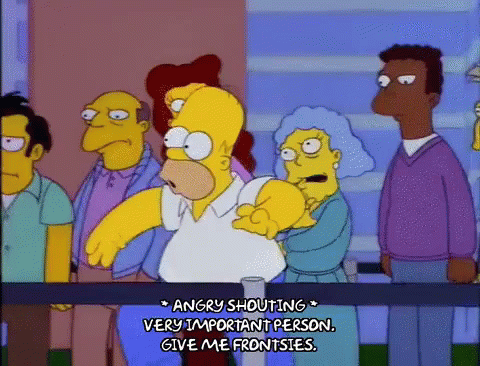Dispatches on Privacy from SXSW
I'm at SXSW in Austin, Texas this week, and, well it's a spectacle.
Howdy, y’all (I can say that un-ironically, now that my feet are firmly planted on Texas soil).
People who know me might be curious as to why I’m here. People who know me well might think that I’ve utterly lost my mind. And the answer is, respectively: South by Southwest, and yes.
I arrived on March 5, after a multi-day flight from DUB —> LHR —> YYZ —> AUS. The Toronto leg of the journey was the most interesting, in part because Toronto, like Dublin is one of the 14 international airports where TSA preclearance happens for international flights bound for the United States.
Years ago, I made the faustian bargain of sacrificing even more of my privacy to the US Government by signing up for the trusted traveler (Global Entry) program in the US. Basically, if you give the USG some money, loads of personal information (which Co-President Elon is probably using right now to train his Government Grok AI), undergo a background check and an in-person interview, and have your facial biometrics stored in a database, you can benefit from expedited clearance in passport control. Basically, it’s like that Disneyland express pass, but with all your personal data.

The only reason I mention this here is that the Global Entry system keeps improving every time I visit the United States. In the early 2010s, Global Entry mostly meant a shorter line, and not having to do some security theater kabuki (shoes off, liquids & laptops out). But, you still had to go to a kiosk, print out a little paper, and then talk to an immigration officer at the other end. But now? You stare at a camera, it records your face, and you breeze past a guy who greets you by name and welcomes you home.
This is both Minority Report levels of scary, while also being extremely convenient. And it’s a reminder of how efficiency and expediency can do a lot to overcome our inherent resistance to surveillance.
Thinking About Privacy at the Capitalist Bacchanal
I’ve never been to SXSW before, nor Austin, for that matter. But I have been to many large conferences in the past (IAPP, RSA Con, Defcon, etc.), and my general takeaway has always been the same: there’s a lot of stuff happening. Lots of things to see and do. Lots of parties to attend, people to meet, and swag to collect. Lots of noise, crowds, and people who should become better acquainted with the concept of a shower. Oh, and lots, and lots, and LOTS of lines. For food, to see an event, to ‘experience something’, to get free booze, or if you’re a lady, to use the restroom.
In fact, when a conference is so big, as is the case with SXSW, there’s a whole set of interactions that take place entirely in the liminal space that exists between the sessions and events themselves. I think I actually enjoy this part of the conference — what I lovingly refer to as ‘line-con’, or alternatively, ‘hallway-con’ — far more than I should. I often learn just as much standing around as I do attending the actual sessions.
For example, while waiting for the delayed Strategic Foresight 101 course (technical issues plague even the most seasoned of professional prognosticators), I struck up a conversation with a UX design consultant who previously worked for a major US auto company designing auto telematics dashboards. We chatted a bit about the systems he consulted on, including the use of cameras in rear-occupant alerting.
My fellow line-con friend admitted that he rarely considers privacy impacts in his past or current roles, because it never feels particularly relevant for him. Like so many people I’ve met, his experience with privacy, data protection, the impacts of ever-present surveillance networks, and the ceaseless development of torment nexii — rarely surface at all, and when they do, they manifest in ways that are merely annoying, but not quite worrying enough to warrant outrage.
This is of course, a design choice in itself. Developers of these systems know this and engineer their products and systems in a way that adds friction points & cognitive load, without being so oppressive that they spill over into Kafka-esque limits to our daily lives. As Meredith Whittaker noted in her session, these design choices are less motivated by evil, and more by perverse market incentives.
SXSW Has Some Great Sessions!
The whole SXSW event kicked off with Meredith Whittaker as the first featured speaker. Whittaker is the outspoken CEO of the E2EE chat app Signal, and a force of nature. I’ve been a loyal Signal user and supporter for years, but had never heard her speak. I’m so glad I had the opportunity at South By. Let’s just say, my already enormous lady crush grew quite a bit as she brilliantly and hilariously answered some of the dumbest questions I’ve ever heard presented to a CEO in my life. I don’t mean to throw shade at Guy Kawasaki, who I’m sure is a lovely guy, but the questions he asked her, vacillated between subtle variations of the ‘privacy vs. security’ trope to him openly asking Whittaker about why Apple iMessage sucked so hard. I was fucking embarrassed for her, and if I’d been in her shoes, I don’t think I would have handled it even half as elegantly as she did.
Still, elegant she was, and she deftly moved between simplifying complex, technical things like standards and the Signal protocol, to explaining why we all should care about the impact of surveillance capitalism and the privacy impacts likely to arise from Agentic AI. I have so many questions for her, but I suspect I’ll have to become more fancy in order to actually get some face time. Ah well, a girl can dream.
In short, she made privacy tangible and real for an audience who mostly wasn’t aware that Signal even existed, much less used it day-to-day.
One of the other sessions that stood out, the aforementioned Strategic Foresight 101 course, gave me tons of things to think about. The 101 course was an accessible, engaging introduction into strategic foresight, put on by Amy Webb and her team at the Future Today Strategy Group (FTSG). Foresight 101 is part of a larger masterclass series on the subject FTSG is running at SXSW. I’m sad I won’t be able to attend all of the masterclass series due to scheduling conflicts.
Mark Palatucci, who presented the 101 session, was both entertaining, and a wealth of knowledge. He walked us through the history of strategic foresight, how it differs from the broader category of futurism.
Tl;Dr:
‘Futurism’ is anything and everything that involves thinking about the future, and frequently involves talking out one’s ass.
Whereas ‘Strategic Foresight’ is a data-driven, practice for developing plausible future scenarios based on current signals & data to inform decisions. It’s heavily reliant on scenarios and examples to motivate behavior. Strategic foresight is a sub-category within the larger futurism space.
I plan to dig into strategic foresight more, and see how I leverage it as a tool for anticipating future trends, based on the decisions and choices we make now. Particularly, decisions related to legal & regulatory policy, corporate concentration, the rise of the network state and the Nerd Reich, data centralization, and other signals that impact privacy, human autonomy, and individual rights.
As I’ve said to anyone who will listen, the core theme and overarching goal of this blog is to try to translate what is often boring, dry legal nerdiness into something relevant for all of us. Including people like my fellow line-con friend.
And finally, here’s a dude who looked at his dial for ‘Keeping Austin Weird’ and turned it up to 11, by riding his horse back from South By. This guy gave zero fucks, and I love him for it.


The comments on Guy’s questions are spot on 😬
Absolutely loved this Carey. Have you picked up any cowboy boots yet?